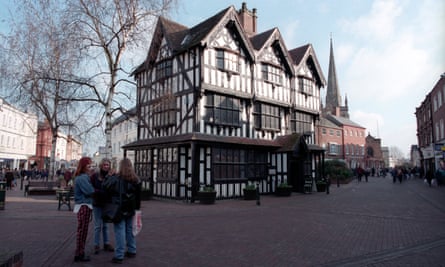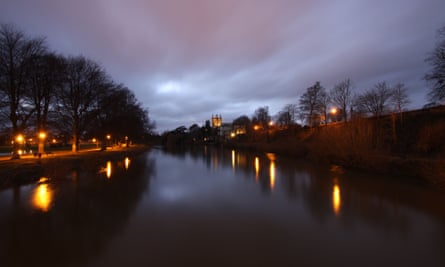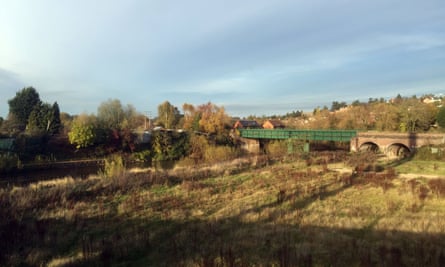There is a mysterious feel to Hereford, the picture-book English cathedral city on the border with Wales. When I stop people in the street to ask if they know the city houses a massive private security industry that operates in conflict situations all over the world, some say they don’t even know what private security is.
But many other residents have military or intelligence connections themselves. One man tells me: “I am local but I don’t want to say what I do.” He continues: “A lot of stuff goes on in Hereford; it’s a right little hub. There’s a lot of very deep stuff here, but it’s kept very hush hush.”
The world’s private military-security industry is always controversial, with critics arguing that it operates in a lawless regulatory climate and undermines the very fundamentals of democracy: the idea that only an accountable state has the right to the legitimate use of force.
Many Hereford locals remain unaware that this burgeoning industry is being developed on their doorstep. There is very little in the local newspaper, The Hereford Times, on the subject, and even less in the national media. But with new groups emerging to represent the security and defence industries in the city, that could be about to change.
A recent report from War on Want called the UK the globe’s “mercenary kingpin”, and found that no fewer than 14 private military and security companies are based in Hereford. That number is growing, and has made this 60,000-strong city a major hub for an industry which has boomed during the “war on terror”.
The business model involves providing “soldiers for hire” to companies and governments around the world, to protect assets and important people from criminals and terrorists (and sometimes dissidents). It is a multibillion dollar industry operating in virtually every country in the world. Few outsiders, however, would expect quaint old Hereford to be a key player.
As the rain comes down and evening descends, it starts to feel like we’re in a Kafka novel, and there’s a conspiracy going on: everyone is part of this strange ex-military, ex-intelligence milieu, but no one can speak about it.
One man who won’t give his name says he “used to work for the Ministry of Defence in the security business … Hereford has become a private military centre because of the SAS,” he explains. “There’s other units too, and a lot of them tend to settle here after they’ve finished their time, so they go into that sort of field.”

Another woman I speak to doesn’t know what a private military company is, but agrees: “There’s a lot of people involved in the SAS or military here, so yes, people will know what is happening. On the private military industry, lots of people here are probably profiting from it – so they wouldn’t be complaining about it, and it wouldn’t be in the newspaper.
“You don’t see soldiers around in uniform here,” she adds, “but they are all over the place in their civilian clothing. And if there’s a pub fight, it’s always shut down pretty quickly by the SAS guys ...”
Walking around central Hereford, with its thatched-roof houses and grand Edwardian offices, it’s hard to believe there are companies here that are intimately involved in many of the most dangerous regions in the world, from Somalia to Iraq.
On St Owen’s Street, in the heart of the city opposite its grand registry office, two private security companies, Octaga and GardaWorld, have offices in a twee redbrick set of houses. The latter has work in places as diverse as Haiti, Libya and Yemen – yet on a frosty winter evening standing outside their headquarters, it’s hard to feel further away from those places.
The main reason for Hereford’s position at the centre of global conflict is its location right next to the village of Credenhill, where Britain’s Special Air Service – the SAS – is based. There is, of course, no official acknowledgment of this fact, but when you drive into Credenhill and pass the RAF base, you see the layers of armed police and military manning the entrance.
Signs invoking the Official Secrets Act and banning photos are tacked to the walls of buildings here. In 2010, the undercover nature of the base became controversial when Google Maps refused to take off images of it on the maps of the area.
The War on Want report noted that “at least 46 companies [throughout the UK] employ former members of the UK Special Forces”. Since George W Bush launched the war on terror in 2001, it has become the UK’s – maybe even Europe’s – principal location for private security and military companies, or PMSCs, as they are known in the business. Now, there is a move to formalise and consolidate this community of security services in the city, under the banner of the Herefordshire Security & Defence Group (HSDG).

“If someone had said to me that British private security companies have ex-intelligence or special forces in their membership, obviously I wouldn’t have been surprised by that,” says Sam Raphael, a senior lecturer in International Relations at Westminster University and author of the War on Want report. “But what is surprising is the extent to which that’s the case; the sheer number of operations and outfits [in the UK] that are employing ex-special forces, who have operated in a shadowy world working for the state, and now continue to operate in a shadowy world.”
Hereford’s military history
The military imbues Hereford. In the local Waterstones, SAS books get pride of place in the main display; there are shops selling military gear, and leaflets everywhere advertising the Military Wives Choirs’ “Home for Christmas” concert at the cathedral.
The city has a long military history and always adapted to the changing nature of war. The SAS base at Credenhill was previously RAF Hereford. In the first world war, the Herefordshire Regiment was a Territorial Force – but it was one of the first to volunteer for overseas service, and went on to serve in Egypt, Palestine and France.
On 27 July 1942, the Luftwaffe bombed the Rotherwas Munitions Factory on the outskirts of Hereford: a site which is now an industrial estate housing a private security company.
The SAS was formed in North Africa in 1941 by David Stirling, who had grown weary of the failures of large operations and wanted to switch to faster-moving, four-man patrols. Since 1960, 22 SAS, the regular army unit, has been based in Hereford. In 2000, the regiment moved to the RAF base at Credenhill. It is thought to have four operational squadrons, each comprising around 60 men.
Most of the private security companies in Hereford have been started by ex-special forces soldiers. The PMSCs offices are located all around Hereford, from quaint old houses to industrial estates on the edge of the city.
The walk from the centre of Hereford to the offices of Ambrey Risk – a private security company focused on maritime protection against modern-day pirates, for example – is a full-on country affair. About five minutes of walking outside the city brings you to a bridge jutting across the River Wye, with greenery as far as the eye can see. This continues until you reach the Thorn Business Park.
Inside Ambrey’s nondescript office, 40 people are manning the phones, working on securing the assets of some of the biggest companies in the world in some of the most dangerous places in the world, from Somalia to Nigeria. When they look outside their window, however, all they can see is freight lorries standing on a rainy, windswept industrial estate on the outskirts of Hereford. It’s a bizarre juxtaposition of worlds.

John Thompson was in the parachute regiment from 2003 to 2009, working within the special forces support group for most of that time. He then worked for a big international security company in Africa, before setting up Ambrey Risk in 2010. Thompson says he set up shop in Hereford because it’s where he is from (he’s a local boy), but also because “there is a small pool of security companies here that are born out of people being in the regiment, and there is a small mini-hub of security and defence companies in Hereford. It’s a good place to be if you want to be in this line of work; one of the few areas in the country where there is a small cluster of companies that do what we do.”
Thompson is now pushing to bring the private security companies in Hereford tighter together. He recently helped set up the HSDG, which will meet regularly to create coordination and synergies between the industry in the city. The group calls itself “an association of security and defence companies”, formed by local Herefordshire companies with the aim of “raising significantly the commercial and industrial capacity of this niche and specialist sector in Herefordshire, for the benefit of group members and the wider community”.
“There are 15 companies locally,” Thompson says. “We are probably the biggest in terms of these companies – but we know pretty much all the others, and the HSDG is our first attempt to get everyone talking, and working together both to win work and to share our ideas and information.”
Guns for hire
Hereford is a particularly attractive location because office space is cheap and readily available, and because the city sits in the middle of huge expanses of countryside, where residential training courses can be easily organised. One of these training centres lies on the outskirts of Hereford in the sleepy village of Madley: population 1,200. It’s the closest thing to the Postman Pat bucolic idyll one can imagine, with the Red Lion pub, parish church and post office the only signs of life outside of the grazing cows in the surrounding fields.
But nearby stands an unremarkable, converted barn which, every six weeks, is filled with prospective recruits for the global private security industry from places as diverse as Eastern Europe, the US and Latin America. Here’s where some of the next generation of “guns for hire” start their journey – from those guarding VIPs in war zones to corporate assets in the developing world. Madley and Baghdad couldn’t seem further away, but they are intimately linked by conflict.

John Geddes is the founder and owner of Ronin Concepts, a private security company set up in 2004. Geddes spent his long military career in the parachute regiment and SAS, before quitting and going to Iraq as a private soldier with British company Olive Group. He became disillusioned with the quality of those applying for jobs, and saw an opportunity to move into training.
“In 2004 I jacked in Iraq and came back to the UK, and threw all my money into creating Ronin Concepts,” he tells me as we stand inside the converted barn.
Geddes says Hereford is the kind of place where, if he goes out, he will see other people from PMSCs and say hello. It’s a community.
“For instance, we just did a venue in Glasgow, an executive protection job,” Geddes says. “I raised a team of six in Hereford and took them up to Glasgow; five days’ work, and we flew back yesterday – it was fantastic.” He then admits: “We’re all friends, but it’s a quiet competition.”
Inside the barn, dummies lie on the floor with plastic heads strewn around. The main wall has a big screen on which Geddes puts his training videos, showing live-fire training in Poland and the US (he has training properties in both countries as well).
Geddes explains the unlikely success of the UK in dominating this multibillion-dollar industry. “The answer goes back a couple of hundred years to the rise of the East India Company, which was a private military army. They occupied huge tracts of the globe, and mostly were ex-services patched throughout the empire.”
Now Hereford finds itself at the centre of this industry, whose continued growth carries deep significance for the future of global conflict. “Private security and military companies mean that being able to constrain the use of force and making sure it complies with morality and the law becomes increasingly hard,” says Sam Raphael, the academic who has highlighted the UK’s – and Hereford’s – leading role. “Holding states to account, and ensuring regular armies use force in proportionate and legal ways, is hard enough – never mind the number of different actors we see proliferating now.”
A number of these private-sector actors are using Hereford as the stepping stone into a world of hyper-violence and big money – to the discomfort of some locals, at least. As one exclaimed when told about the industry in the city’s midst: “How is that legal? That’s not legal, surely!”
While the legality of these industries is not at issue, there is no specific regulatory framework – and a visit to this sleepy cathedral city raises many questions in these turbulent times.
Travel support for this article was provided by the Pulitzer Center on Crisis Reporting

Comments (…)
Sign in or create your Guardian account to join the discussion